- About Us
- Policy Center
- Learn
- Press Room
- Blog
- Get Involved
- Donate
- Donate to J Street Online
- Make a Gift in Someone’s Honor or Memory
- Make a Monthly Gift
- Tax-Deductible Donations
- Giving by mail
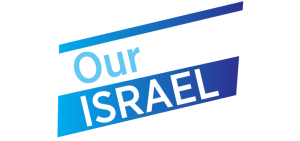
J Street is proud to stand with progressive Israeli organizations who do amazing work to create a better future for Jewish Israelis, Arab Israelis and Palestinians. As part of a series of profiles focused on our progressive partners, we’re lifting up the important work Jerusalem Open House for Pride and Tolerance, an LGBT+ community center in Israel’s capital.
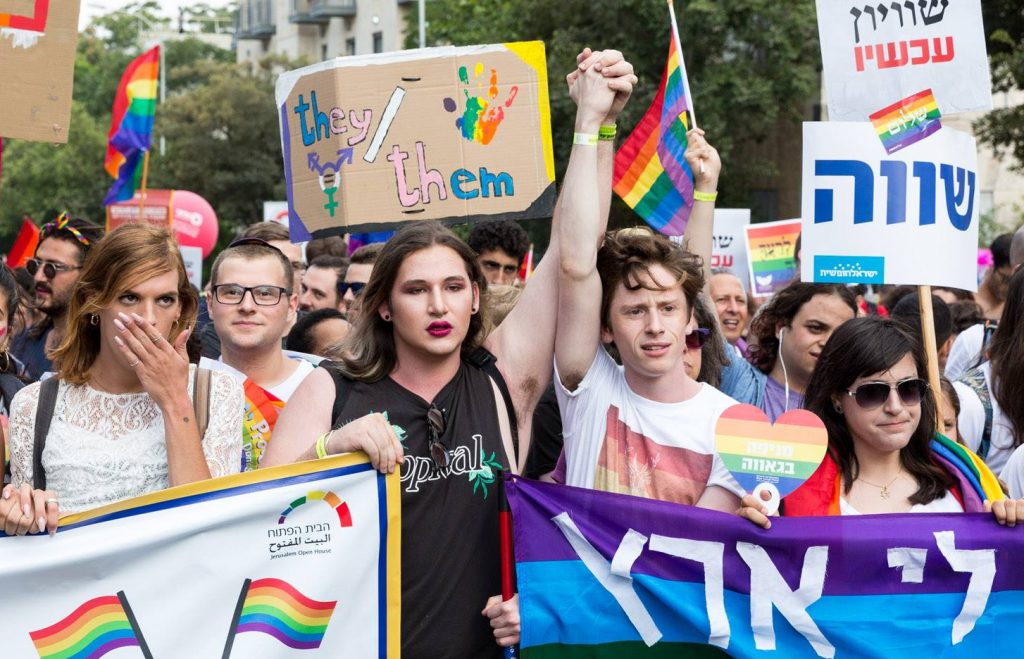
Photo Credit: Mooli Goldberg
Time hasn’t made it any easier for Micha to talk about the attack — but through breaks for deep breaths, he says it’s important for people to know what happened.
He was 17, volunteering with Jerusalem Open House, the LGBT+ community group which runs the city’s annual pride parade. Next to him was Shira, 16, a girl from school he’d hardly ever spoken to. “We talked about cats and we talked about really ordinary stuff,” he says. Her shirt was the conversation starter — six pride cats in the various colors of the rainbow. He remembers being impressed with how friendly, witty and caring she was.
Then, suddenly there was chaos and screaming in the crowd. Micha dove one way, Shira the other. An extremist, homophobic, ultra-Orthodox attacker had brought a knife to the parade, stabbing six people. Micha remembers seeing the blood spreading across Shira’s shirt.
“She didn’t really understand what was going on, she was reaching with her hand to her back to figure out what’s happening, and then she just dropped,” Micha says. “She only came to support us, and she was murdered for it.”
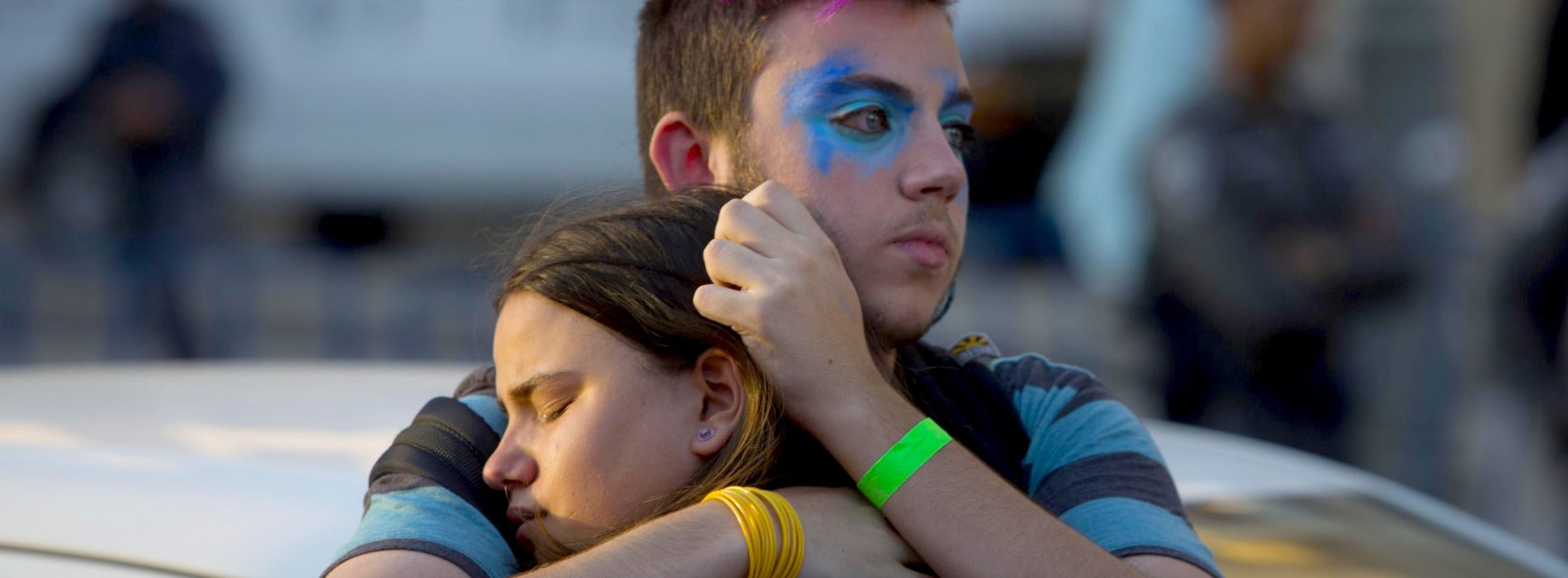
The 2015 attack, in which six others were injured, sparked an outpouring of grief across Israel. “I remember going to her funeral, and there were just so many people there,” Micha says, “journalists, teachers, students — it was overwhelming.”
For the LGBT+ community, it was an event which brought national attention to the stark contrast between Tel Aviv’s reputation as the Middle East’s gay mecca, and Jerusalem’s long-running tensions between its religious residents and a deeply marginalized LGBT+ population. It’s a challenge LGBT+ Jerusalemites have grappled with for decades, if not centuries — some scholars have argued that King David himself was queer.
“Jerusalem is a city which is both diverse and conservative,” says Alon Shachar, Executive Director of Jerusalem Open House. “Many people still see LGBT+ issues as a contradiction to the holiness of Jerusalem, something that stains the status of the city.”
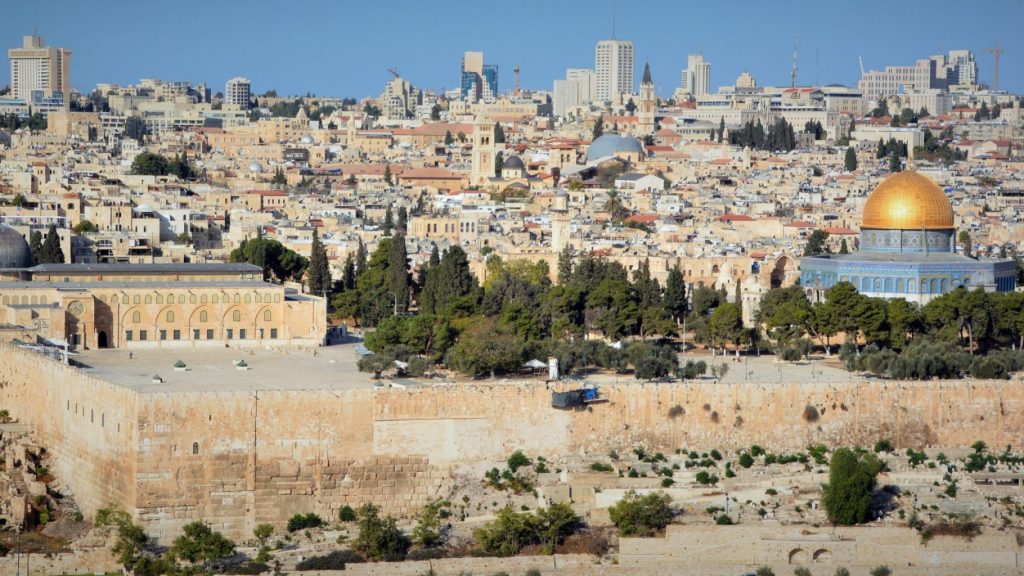
In Jerusalem, holding a pride parade is a battle in and of itself. Jerusalem Open House has even had to take the local government and police to the Supreme Court to get them to issue the required recognition and permissions. “It’s really unbelievable the preconceptions about Jerusalem, the idea that LGBT+ individuals don’t exist in Jerusalem, and the issues they face don’t need to be addressed,” Shachar says. “In Jerusalem, the parade is more of a protest than a party,” says Micha.
In the 1990s, out of the desire to establish a permanent presence in the city, local queer groups and organizers banded together to found The Jerusalem Open House for Pride and Tolerance, and it remains at the center of Jerusalem’s LGBT+ community today. “Our approach is holistic,” Shachar says. “We see all our programs and projects as connected, each program benefits from the other one.”
JOH is an advocacy, education and organizing hub, having started the city’s first annual pride parade in 2002. They also operate the city’s only LGBT+ health clinic, with essential health services, mental health services and discrete, easily accessible STI testing. And since they only compete with one gay bar in the city, JOH is also a major meeting and networking hub, with regular meet-ups for different age groups and religious groups.
Housed in a relatively nondescript building a stone’s throw from Ben Yehuda Street in downtown Jerusalem, the rainbow flag hanging outside Jerusalem Open House can be easy to miss among the bustling shopfronts. It’s somewhat intentional, a decision that illustrates the ongoing tension between visibility and discretion for LGBT+ residents. “We acknowledge that some LGBT+ people come from a background which might make it impossible for them to get into our space if it means that they would be directly recognized,” Shachar says.
It was outside the JOH building that a 15-year-old Micha stood seven years ago, petrified of going inside and struggling with intense feelings of gender dysphoria. “I was really, really scared and it was really cold, so I didn’t know if I should stay outside or I go in or what,” he says. “Then I said, ‘Okay Micha, it’s okay, you can do this — get inside and what will be will be.’”
What he found was a supportive community, and friends who — for the first time — understood what he was going through. “Gender dysphoria is a really, really hard thing for me, but there were other people like me, experiencing the same things that I felt and thought and wanted. It really made me feel like home,” he says, “the other youths became like siblings, and the guides were like big brothers and sisters who could guide me to the life I want.”
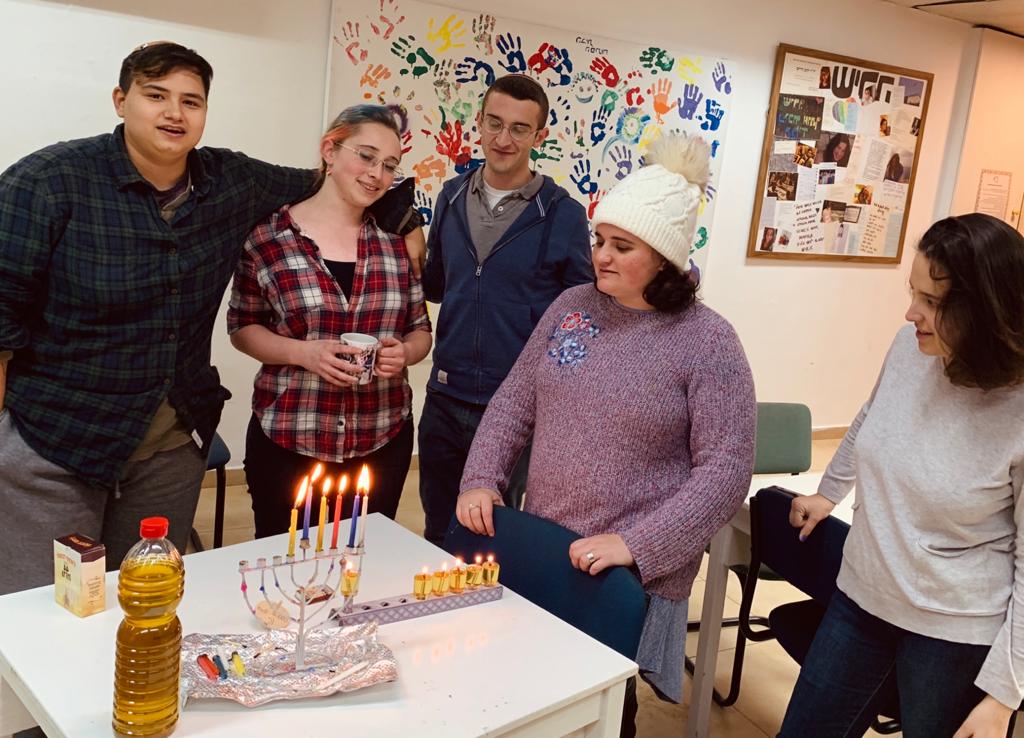
Photo Credit: Jerusalem Open House
Their validation ultimately gave Micha the strength to come out as a trans man to his Reform Jewish community — where he found nothing but support. “They said, ‘you’re not changed, just the name and the pronouns, that’s it.’”
It’s an experience that doesn’t go so positively for everyone, especially for those from an ultra-Orthodox background. “Many young people from these backgrounds find themselves deep in the closet, or kicked out of their homes if someone finds out about their orientation or gender identity,” Shachar says.
The Executive Director remembers finding an 18-year-old Haredi boy outside the center one day, homeless and hungry. Staff bought him food and a ticket to Tel-Aviv, calling ahead to an LGBT+ shelter there to make sure they had a place for him.

Shachar says many are surprised to see traditionally dressed members of the ultra-Orthodox community in the center, but notes that LGBT+ Haredi need support, especially since they face additional integration and sexual health challenges. “They may need to adapt to the secular world, to life in the LGBT+ community and to learn how to keep themselves safe,” he says. “Without that, they can find themselves in some very vulnerable situations.”
The center runs support programs for those wishing to leave the ultra-Orthodox community, as well as for those wishing to stay within it. “We believe that people shouldn’t have to choose between their identities, you can be LGBT+ and a religious person at the same time, there is no contradiction,” Shachar says.
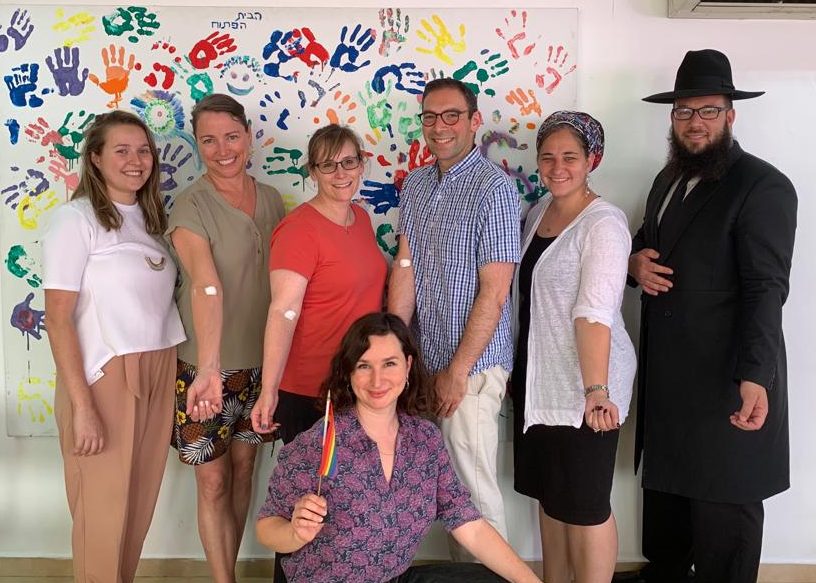
Photo Credit: Jerusalem Open House
But it’s not just on a personal level that JOH seeks to effect change, it’s on a societal level as well. The group runs educational sessions and workshops around the city and advocates for more inclusive service delivery, especially when it comes to sexual health and trans healthcare. The organization also takes a strong line against conversion ‘therapy’ — a debunked and psychologically damaging practice — which remains legal in Israel.
LGBT+ groups across Israel have also been sounding the alarm over violence against identifiably LGBT+ individuals. It’s a risk the community has become acutely aware of since the 2015 attack. “I didn’t feel safe anymore after the attack, especially around super orthodox people with the coats,” Micha says. “He pulled the knife out of one of those coats — I felt unsafe for a very long time, but now I’ve regained my sense of security.”
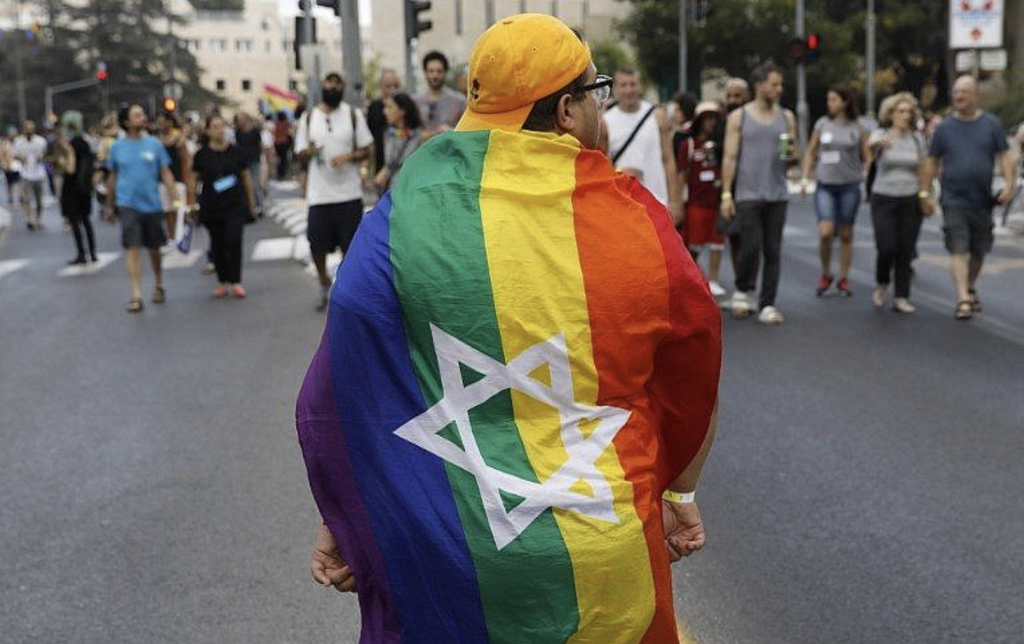
In recent years, The Aguda advocacy group has reported a significant increase in violence and hate speech. In Jerusalem itself, parts of the city still remain unsafe, with verbal and physical harassment, including spitting, all too common.
“People here are always aware and alert in some places,” Shachar says, attributing the rise in attacks over the past few years to increasingly caustic political rhetoric and homophobia from right-wing political parties. Rabbi Rafi Peretz — who serves as Israel’s education minister and head of the ultranationalist Jewish Home Party — has publicly supported conversion therapy.
“It’s important to understand that this type of thing directly affects our communities, especially teenagers who are at high risk of self-harm and suicide,” Shachar says, noting that LGBT+ people in Peretz’s ultra-Orthodox constituency are at particularly high risk. He recounts stories of young men who have gone to extreme lengths to hide preventative HIV medication from their parents, or calls to the center from petrified, isolated teens, completely unaware that it’s possible to live a happy, healthy life as an LGBT+ person.
It’s those complex, delicate cases that mark some of the most powerful moments of success for the center, Shachar says. A year after arriving at the center homeless, confused and hungry and being referred to a Tel Aviv shelter, the young gay Haredi boy returned, this time as a proud man with a boyfriend. “He was at a totally different place and so much stronger,” Shachar says, “it’s just amazing to see that kind of change.”
In June 2020, J Street hosted a conversation with Noam Yavin, Co-Chair of Jerusalem Open House, and Professor Aeyal Gross, founding member of Tel Aviv University’s LGBT & Queer Studies Forum as part of our pro-Israel, pro-peace, pro-democracy streaming program, J Stream:
J Street is at the forefront of a political movement to push back against the Trump-Netanyahu agenda and lay the groundwork for a new era of progressive, values-driven diplomacy-first American leadership.